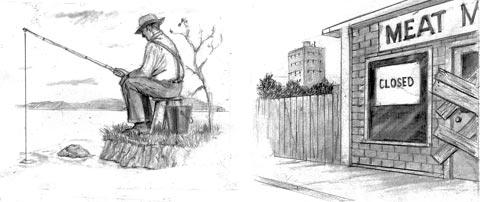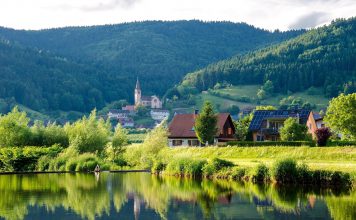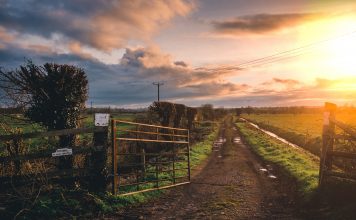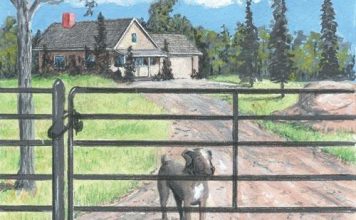 |
|
| Issue #115 • January/February, 2009 |
I was a girl of 8 when the stock market crashed in 1929. It was the Great Depression, and unless you were living during the Depression years, you can’t really understand how tough they were. Our parents knew, however, as they went about trying to raise families under the worst of economic circumstances.


Even though my husband, James, and I were children, we were old enough to be aware of The Great Depression and the effect it had on our families and everyone around us. However, let me say from the outset that being in the same boat with many other Americans made it bearable. We didn’t realize that we were poor as we were all trying to make ends meet and somehow survive.
|
James’ family lived in a rural neighborhood where his father farmed some homesteaded acreage and ran a small sawmill where workers were paid fifty cents per day. He also hauled gravel and red clay from his acreage and sold those to a local cement company and an earthenware tile company. When gardening season came around, he sold produce to a local cafeteria. Among the vegetables were small Irish potatoes that were served unpeeled with English peas or were eaten separately. To maintain a supply of the small potatoes, Mr. Yeager kept bags of them in cold storage until needed.
The Yeagers were enterprising and hard workers like others who managed to survive a period in our history that will always be remembered as one of the worst economic times our country has experienced. I believe some good almost always comes out of adversity and so it was with the Depression. It instilled in all of us the knowledge that we can work our way through almost any bad situation if we just determine to do so.
Now, as to the Brantley side of the story. My family was a bit more fortunate, as far as steady income was concerned, because my father had a job with the government as a railway mail clerk. He was also a World War I veteran and drew a small pension for a heart condition related to the war. His total annual income would be way below the poverty level today.
|
Both the Yeager and the Brantley families had come from self-reliant backgrounds. They invested a lot of their time and energy in gardening which was almost a “have-to” in those days. My father had a sizable garden even though our place consisted of only a house and three 50-foot x 150-foot lots. We even kept a flock of chickens for eggs and an occasional tasty meal and we had a Jersey milch cow. The Yeagers also had chickens and a cow. (Was I ever glad when the cow was sold as there was the daily walk to and from the rented pasture about four blocks away where several other people pastured their cows.) As you can see, there was a big emphasis on economizing on food costs. Some people stretched their food budgets by fishing and hunting.
Canning and preserving plenty of fruits and vegetables were emphasized. There were no freezers or air conditioners to make the job of canning or preserving easier. In our area of southwest Arkansas, canning was done over woodburning stoves as wood was the easiest fuel to come by. (We complained about the cost of a cord of wood just as folks in the North complained about the cost of coal or fuel oil.) A few people dug root cellars where certain vegetables such as potatoes and turnips could be stored. Most summer vegetables had to be canned while at their peak of perfection. Imagine the heat created one day with a high of 95 degrees or more even if one started canning early in the morning. Nevertheless, this was done to avoid having to resort to spending money at the neighborhood grocery stores that were trying to survive, too.
Frugal folks often bragged about how many jars of beans, peas, corn, tomatoes, pickles, fruit, etc. they had put away. In addition, they often scoured the local countryside for blackberries, wild plums, muscadines, native pecans, hickory nuts, and anything else considered edible.
Times have changed and, in some ways, our lives have improved since the Great Depression, but there is still a close similarity to our present economic time and the years of “forced frugality.” Loss of jobs and cuts in working hours and pay are very reminiscent of the 1930s. Even my father’s hours were cut back along with those of many other government employees to help employ some of the jobless. Everyone blamed the Republicans and President Herbert C. Hoover for the whole mess just as the past administration caught flak.
|
A visual sign of the times were the hundreds of job-seeking men riding in empty boxcars on railroads. They were called hoboes and many considered them vagrants. The majority of those men were going from place to place desperately seeking employment. Some would hop off of the trains and seek meals in nearby neighborhoods. My mother often wondered why they would come by our house as we did not live near the railroad, but nevertheless she saw to it that no man went away hungry.
Lawlessness ran rampant during the Great Depression. Even neighbors stole food from neighbors simply by breaking into houses while the occupants were away. Other items were taken, toojewelry, antiques, toolsanything that could be pawned or sold. When thieves could manage, they took animalshorses, cattle, even chickens. The Yeagers lost a number of turkeys.
Bootleggers were already in business when the Great Depression occurred. The United States had a federal law (1920-1933) that forbade the manufacture, sale, transportation, etc. of alcoholic beverages. This was generally called Prohibition. As could be expected, there were those entrepreneurs who defied the law and went about setting up stills in hidden places usually along spring-fed creeks. Their product was known as rot-gut. Ironically, the rise in the number of stills created more jobs for government employees known as “revenuers.”
In connection with the sale of illegal liquor, sheriffs became aware of certain store owners selling unusual amounts of copper. (Copper was used in making and repairing stills.) Therefore, the sellers would have to restrict, for a time, the amount of copper they handled. Likewise, the sale of sugar. Purchasers swore they needed sugar for canning fruit, preserves, etc. The local sheriff said there couldn’t possibly be that much canning going on. So the amount of sugar sales had to be “monitored.”
|
Some big city gangsters became Robin Hoods when they helped feed people in bread lines. Al Capone was famous for his help in Chicago. I had a friend who was a chorus girl in New York City during the Depression. She once told me that the chorus girls helped fill sacks with food for the poor. The food was supplied by Lucky Luciano, another gangster.
In our area, we had some famous ruthless outlaws, mainly bank robbers”Pretty Boy” Floyd, John Dillinger, Clyde Barrow and Bonnie Parker, (Bonnie and Clyde). There were others, but these names easily come to mind as they were actually greatly feared by the public because of their lack of pity for their victims.
President Franklin D. Roosevelt tried to pull the United States out of the Great Depression. Work programs were created that employed men as well as women. The Civilian Conservation Corps (CCC), the Works Progress Administration (WPA), National Relief Association (NRA), and the Public Works Administration (PWA) were designed to lift people out of their dire circumstances. Of course, there were the usual jokesters who referred to the workmen as lazy and inclined to lean on their shovels instead of use them.
I believe the CCC was the most outstanding of all of the programs. Men flocked to the CCC where they were paid $30 per month with $25 of that going home to families. Leaders were paid a bit more, $45, and assistant leaders $36. Promotion was Army system. The CCC gave men a starting point in life again. They were housed in camps where they were given training in building bridges, roads, damsthings that benefited the public. Some men re-enrolled when their time was up as they enjoyed the discipline and security of the Army-styled camps where they were given good meals, clean clothing, and a place to sleep.
|
My uncle, W.E. Whatley, learned the trade of stone mason in the CCC and was employed in some of the national and state parks. Many of the picnic areas, bridges, and fireplaces built by the CCC are still in use today. Uncle Ed later returned to his regular professionpainting. During the Great Depression, not many folks could afford to hire someone to paint their houses, so jobs for painters were scarce, too.
I am not positive, but I believe the NRA was the relief organization that sponsored sewing rooms in which many women were employed. My childhood friend and neighbor, Mrs. Harry N. Bell, was one of those women. She was a former school teacher and was given a job as supervisor in one of the sewing rooms.
Some of the things related here seem far fetched to younger people, but bad economic conditionsfolks losing their homes, banks failing, crime on the rise, prices soaring on everything including groceries and gasolineare not signs of prosperity. It will take some time to remedy our current situation and it will not occur as soon as the new administration takes over despite what the politicians would have us to believe.
|
The Great Depression was not all doom and gloom. There were good times, too. Many of us enjoyed going to our favorite fishing holes not only for the outing, but the fish helped to stretch our food budgets. We had very few concrete swimming pools, so we swam in unpolluted creeks and rivers.
Folks were more inclined to gather and play games like checkers, dominoes, and card games. Churches had better attendance than now. Children weren’t encouraged to grow up so fast. They played hopscotch, jumped rope, twirled tops, and did tricks with yo-yos. Older boys and girls played basketball, baseball, softball, skated, etc. There was more physical activity then than playing computer games today, and obesity was not a nationwide problem.
And, so it went. Ordinary Americans managing to get through tough times. Just as our country began to recover from The Great Depression, along came World War II. But, that’s another story.





















My grandmother lived the depression and passed in 2004. She lived the”depression” way the rest of her life.
I too am a product of Great Depression Parents. Their stories of survival is what I accredit my life skills to.